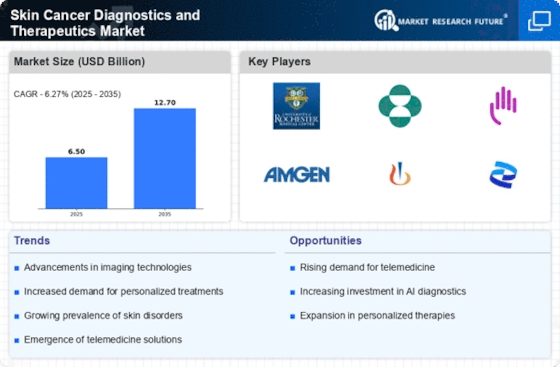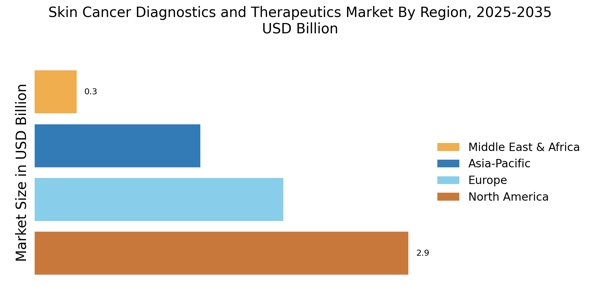Rising Incidence of Skin Cancer
The increasing incidence of skin cancer is a primary driver for the Skin Cancer Diagnostics and Therapeutics Market. Statistics indicate that skin cancer cases have been on the rise, with melanoma being one of the most aggressive forms. In recent years, the number of diagnosed cases has surged, prompting a heightened demand for effective diagnostic tools and therapeutic options. This trend is particularly evident in regions with high UV exposure, where public health initiatives are increasingly focused on early detection and treatment. As awareness grows, healthcare systems are investing in advanced diagnostic technologies, which in turn fuels market growth. The urgency to address this public health concern is likely to drive innovation and investment in the Skin Cancer Diagnostics and Therapeutics Market.
Growing Public Awareness and Education
Public awareness regarding skin cancer and its prevention is a crucial driver for the Skin Cancer Diagnostics and Therapeutics Market. Campaigns aimed at educating the population about the risks associated with UV exposure and the importance of regular skin checks are becoming increasingly prevalent. This heightened awareness is leading to more individuals seeking diagnostic services and preventive measures, thereby expanding the market. Educational initiatives by health organizations are also encouraging early detection, which is vital for successful treatment outcomes. As more people become informed about skin cancer, the demand for both diagnostic and therapeutic solutions is likely to increase, further propelling the Skin Cancer Diagnostics and Therapeutics Market.
Advancements in Diagnostic Technologies
Technological advancements in diagnostic tools are significantly influencing the Skin Cancer Diagnostics and Therapeutics Market. Innovations such as dermatoscopes, digital imaging, and artificial intelligence are enhancing the accuracy and efficiency of skin cancer detection. For instance, AI algorithms are being developed to analyze skin lesions with remarkable precision, potentially reducing the rate of false positives and negatives. The integration of these technologies into clinical practice is expected to streamline the diagnostic process, making it more accessible to patients. Furthermore, the market for diagnostic devices is projected to grow substantially, with estimates suggesting a compound annual growth rate of over 10% in the coming years. This technological evolution not only improves patient outcomes but also propels the Skin Cancer Diagnostics and Therapeutics Market forward.
Regulatory Support and Reimbursement Policies
Regulatory support and favorable reimbursement policies are pivotal in shaping the Skin Cancer Diagnostics and Therapeutics Market. Governments and health authorities are recognizing the importance of early detection and treatment of skin cancer, leading to the establishment of supportive frameworks. These frameworks often include incentives for the development and adoption of innovative diagnostic technologies and therapies. Additionally, reimbursement policies that cover advanced diagnostic procedures and treatments are encouraging healthcare providers to offer these services. As a result, patients are more likely to seek timely interventions, which can significantly improve survival rates. This supportive regulatory environment is expected to enhance the growth trajectory of the Skin Cancer Diagnostics and Therapeutics Market.
Increased Investment in Research and Development
The Skin Cancer Diagnostics and Therapeutics Market is experiencing a surge in investment directed towards research and development. Pharmaceutical companies and biotech firms are allocating substantial resources to discover novel therapies and improve existing treatment modalities. This trend is driven by the need for more effective and targeted therapies, particularly in the realm of immunotherapy and targeted drug delivery systems. Recent data suggests that R&D spending in oncology is expected to reach unprecedented levels, with skin cancer being a focal point due to its rising prevalence. The influx of funding is likely to accelerate the pace of innovation, leading to the introduction of new diagnostic tools and therapeutic options that could reshape the landscape of the Skin Cancer Diagnostics and Therapeutics Market.


















